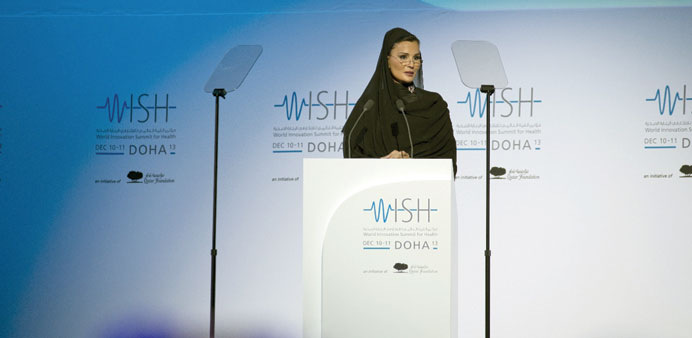HH Sheikha Moza bint Nasser delivers her inaugural address at the World Innovation Summit on Health (WISH) in Doha yesterday. PICTURE: AR Al-Baker/HHOPL
By Noimot Olayiwola
|
|
The Qatar Genome project, which will “chart a road map for future treatment through personalised medicine” in the country, was announced yesterday by Qatar Foundation chairperson HH Sheikha Moza bint Nasser during the inaugural World Innovation Summit on Health (WISH).
“As a result of the integration of scientific research and the clinical realities, I am pleased to announce the project Qatar Genome,” she said while inaugurating WISH.
Later, addressing a press conference on the sidelines of WISH, the Hamad Medical Corporation’s managing director Dr Hanan al-Kuwari explained that under the Qatar Genome Project, a genome mapping of a large group of Qataris is underway.
“The genome mapping will help us to know the diseases and illness in order to have personalised treatment and medications for such diseases,” she said.
The official explained that the genome mapping will involve collection and analysis of DNA apart from finding solutions dedicated to each individual based on their illnesses.
“This project is still in the planning stage and it is one of many projects that are ongoing in the health field in Qatar such as the Qatar biobank, which is already collating data of both Qataris and non-Qataris,” she said.
Al-Kuwari informed that there was already in place a platform for achieving all the initiatives but added that the samples are still limited and hopefully an analysis of the available samples will soon begin.
Earlier, in her inaugural address, HH Sheikha Moza stated that the most pressing social and developmental issues of the world are the education and health issues, which in turn can shape other issues, the severity of which differ and dependent on the development of the country itself.
“During this conference, we aim to provide the ideal environment for intellectual interchange of ideas and to benefit from our shared experiences in the search for comprehensive, pioneering solutions that cover the necessities of each specialty,” Sheikha Moza said while mentioning that Qatar has adopted similar approach.
“When we strived to build our all-inclusive culture of health, we transformed our health centres into research and academic centres, which incorporate hands-on experience,” she said.
“We are creating an environment where we take research to clinical practice through bedside approach,” HH Sheikha Moza added.

